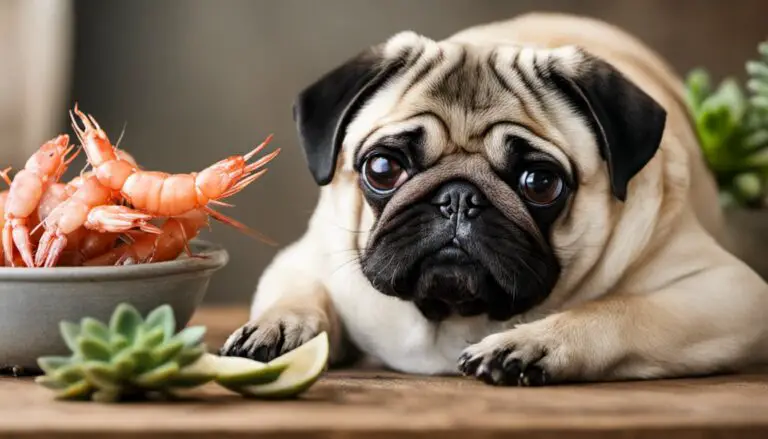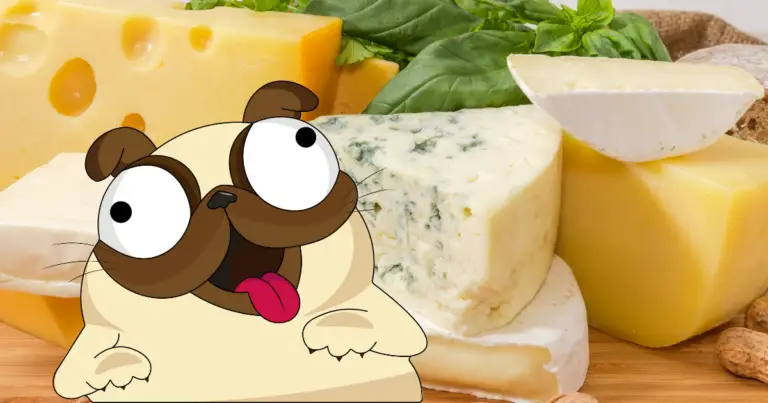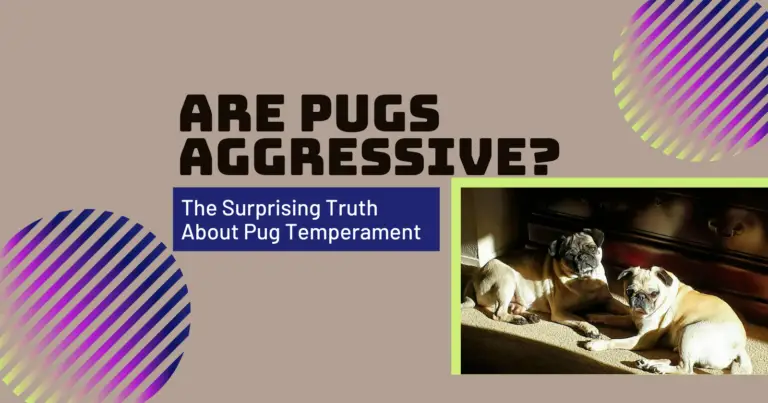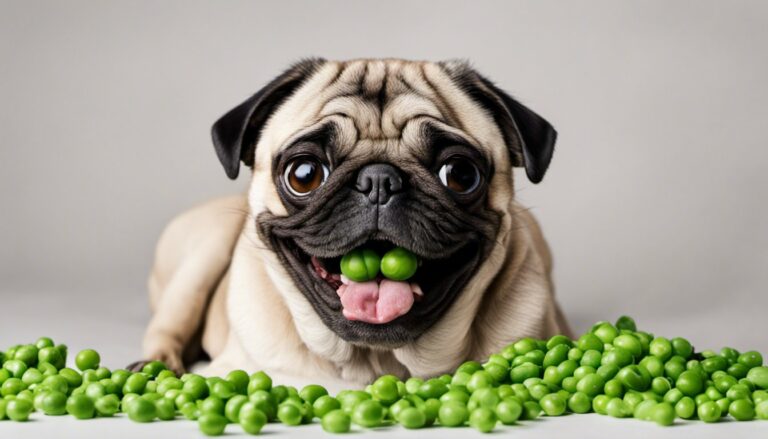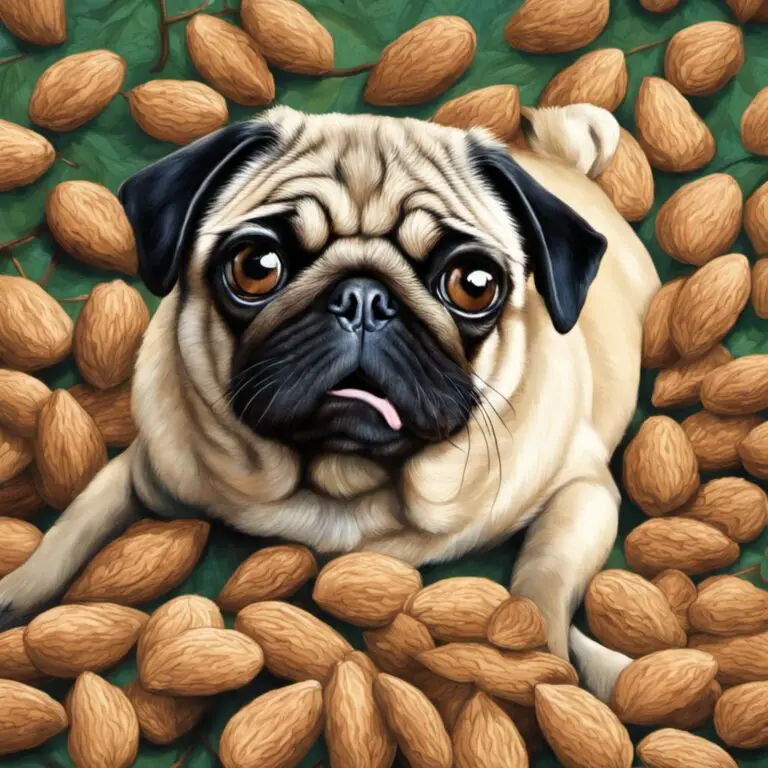Can Pugs Eat Nuts? Uncovering the Truth
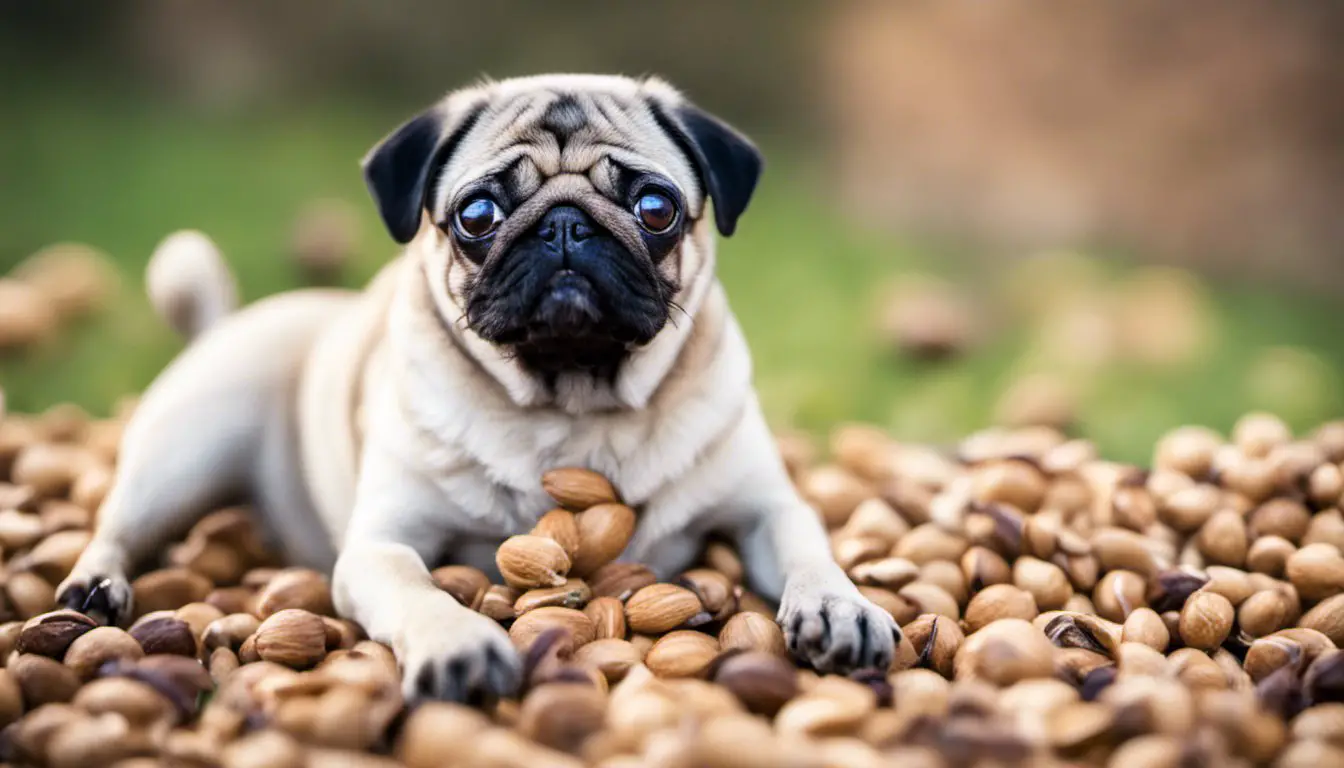
As a pug owner, it’s essential for you to know which foods are safe for your dog to consume. One common question is, Can Pugs Eat Nuts? Nuts are a popular snack choice for humans, providing various health benefits and delicious tastes. It’s only natural to wonder if sharing some with your pug is a good idea.
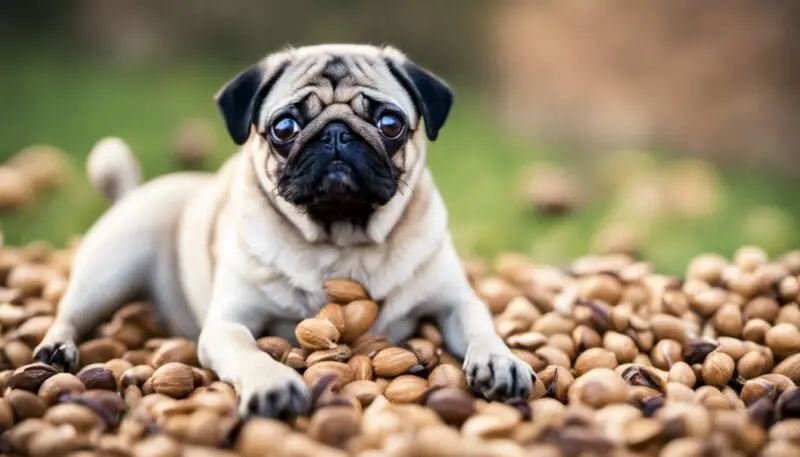
When it comes to feeding your pug nuts, you should follow some specific guidelines. Certain types of nuts, like peanuts and cashews, are safe for pugs to eat in small quantities as long as they are unsalted and unseasoned. However, it’s crucial to keep in mind that not all nuts are suitable for pugs, and some can even be harmful. Moderation is always key, as nuts are high in fat and can lead to health issues if consumed in large amounts.
In this article, you’ll learn more about which nuts are suitable for pugs to eat, which ones you should avoid, and the best ways to incorporate nuts into your pug’s diet. This information will help you make informed decisions about your pug’s snacking habits, keeping them happy and healthy.
Contents
Table of Contents
Overview of Pugs’ Dietary Needs
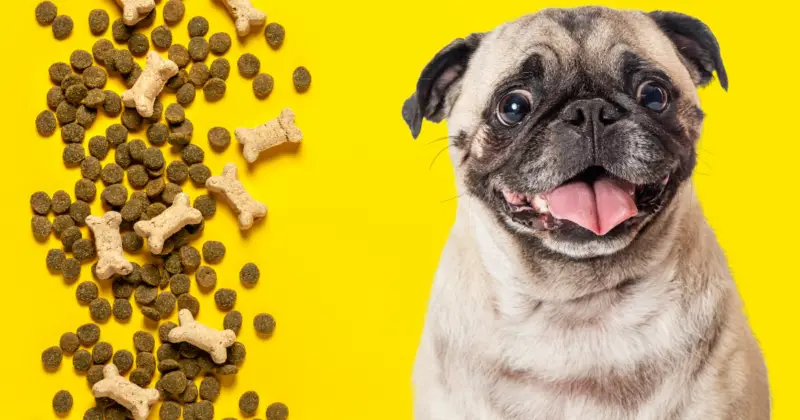
As a pug owner, it’s essential you understand your dog’s specific dietary needs. Pugs require a balanced diet that consists of protein, vitamins, minerals, and healthy fats to support their overall health and well-being.
Get The Free Food Eating Guide That Keeps My Pug Happy and Playful Even at 13 Years Old
100% Beginner Friendly & Lists Real Foods Your Pug Can Actually Eat!
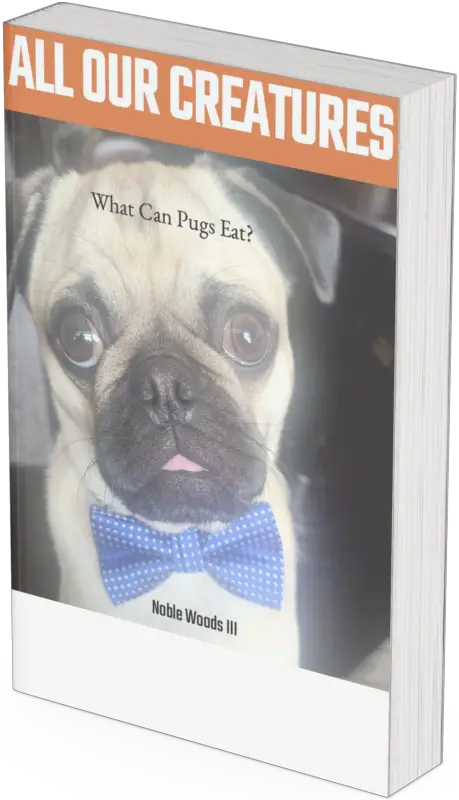
Pugs are known for having sensitive digestive systems, meaning they can experience gastrointestinal issues if they don’t receive the right nutrition. Therefore, paying close attention to the quality and type of food you’re providing is crucial. Protein should play a key role in your pug’s diet, as it helps to maintain muscle mass, support organ function, and promote healthy skin and coat. When choosing a suitable dog food, look for high-quality animal-based protein sources, such as chicken or fish.
Vitamins and minerals, such as vitamin A, B vitamins, and calcium, are important for a pug’s immune system, energy levels, and bone health. Be sure to provide a diet that includes these essential nutrients. Also, healthy fats, like omega-3 and omega-6 fatty acids, are necessary to maintain a shiny coat and cognitive function.
At the same time, it’s crucial to avoid certain foods that can trigger adverse reactions or harm your pug’s sensitive digestive system. Nuts are one such example. Some nuts, like almonds and pistachios, can be difficult for pugs to digest, while others, like macadamia nuts, are toxic to dogs. Always consult with your veterinarian before introducing new foods to your pug’s diet.
In summary, to ensure the health and happiness of your pug, provide them with a diet rich in protein, vitamins, minerals, and healthy fats while avoiding known problematic foods like nuts. Always keep your pug’s unique dietary needs and sensitivities in mind when making food choices for them.
Understanding Nuts and Dogs
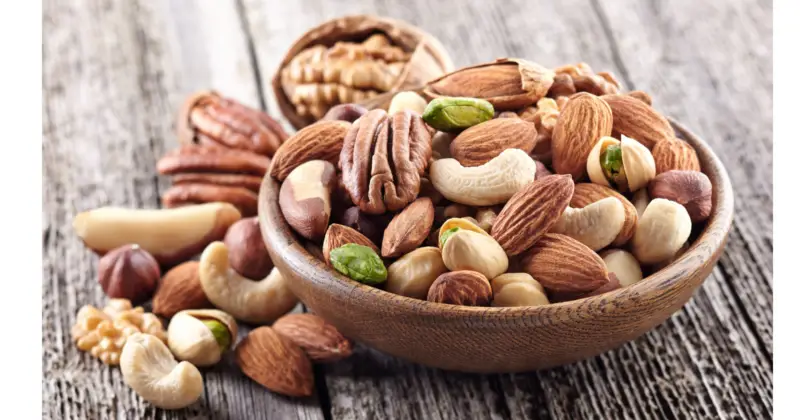
When it comes to your dog’s diet, knowing which foods are safe and which can be toxic is crucial. While nuts may seem like a harmless snack for humans, they can pose risks for dogs. Let’s take a look at some common nuts and their potential impacts on your furry friend.
Macadamia nuts are a definite no-go for dogs, as they can be toxic to them. Ingesting macadamia nuts can cause vomiting, weakness, hyperthermia, and even tremors in dogs, so keeping them out of your pet’s reach is essential.
Almonds are not toxic for dogs but can still pose a risk. Though they’re a healthy snack for humans, almonds can be a choking hazard for your dog, and they may also cause an upset stomach or obstructions in their digestive tract if consumed.
Cashews and pecans can be given to dogs in small amounts, but moderation is key. Overfeeding your dog with these nuts can lead to gastrointestinal issues or even pancreatitis due to their high-fat content. It’s important to ensure these nuts are unsalted and unseasoned to avoid harmful additives.
Walnuts and black walnuts should be avoided, as they can be toxic for dogs. Consumption may lead to seizures or even neurological symptoms, so it’s best to keep these out of your dog’s diet.
Pistachios are another nut that should be avoided. While they may not be toxic, they can cause an upset stomach or even pancreatitis in dogs due to their high-fat content. Additionally, the shells can be a choking hazard or cause an obstruction in your dog’s digestive tract if ingested.
In summary, while some nuts can be safe for dogs in small amounts, it’s essential to be cautious and informed about which nuts can be toxic or harmful to your pet. Always monitor your dog’s reaction to new foods, and if in doubt, consult with a veterinarian for guidance on introducing new snacks to their diet.
Safe Nut Options for Pugs
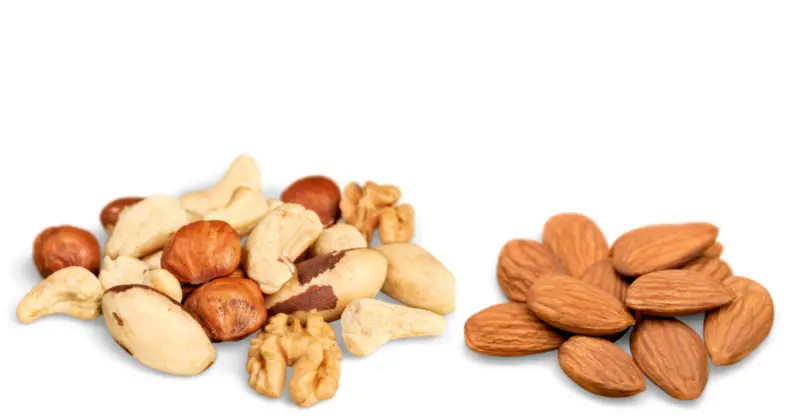
When considering giving nuts to your pug, knowing which nuts are safe and how best to serve them is essential. One nut option that is generally safe for dogs, including pugs, is peanuts. They are considered legumes and can be a fun treat for your pug. However, make sure that the peanuts are unsalted and unseasoned before sharing them with your furry friend.
Serving peanuts in moderation is crucial, as too many can lead to unhealthy weight gain and other health issues. A healthy way to offer peanuts is by using peanut butter as a treat or to administer medications. Be sure to choose a peanut butter that is free from harmful additives such as xylitol.
Cashews are another safe nut option for pugs when given in small amounts, as the American Kennel Club mentioned. Cashews should also be unsalted and unseasoned like peanuts to avoid potential health issues.
When feeding your pug nuts, remember that moderation is key. Both peanuts and cashews can be fed in small quantities to prevent overconsumption of calories, fat, and salt. Remember that while these nuts are safe, other nuts might not be appropriate for your pug’s diet. Always consult your veterinarian before introducing new foods to your pug’s meal plan.
Hazardous Nuts for Pugs and Symptoms of Toxicity
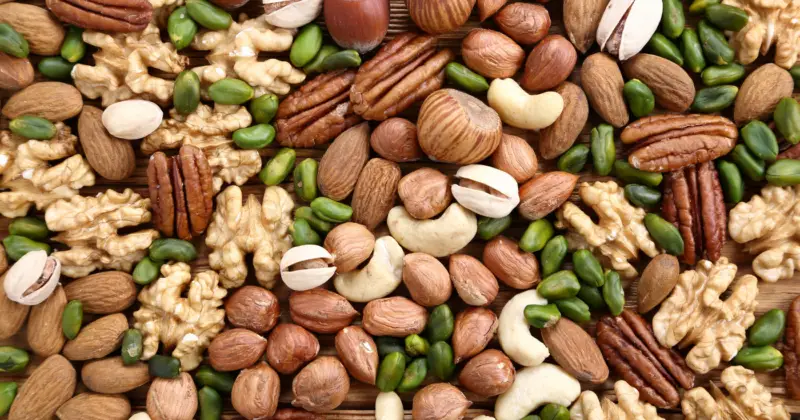
When it comes to your pug’s diet, it’s crucial to be aware of which nuts are hazardous and the symptoms of toxicity. One nut type to steer clear of is macadamia nuts, as their consumption can lead to poisoning in dogs. When dogs ingest macadamia nuts, they may experience vomiting, diarrhea, weakness, seizures, and lethargy. These symptoms typically manifest within 12 hours of ingestion and can persist for 24 to 48 hours.
In addition to macadamia nuts, it’s essential to avoid feeding your pug nuts that are high in fat, such as pecans and walnuts. A high-fat diet can trigger pancreatitis, a condition that can be particularly dangerous to certain breeds like Schnauzers. Symptoms of pancreatitis include decreased appetite, vomiting, lethargy, and diarrhea. It’s worth noting that the coatings on some nuts can also be harmful to your pug, so it’s best to err on the side of caution and avoid nuts altogether.
If you suspect your pug has ingested a harmful nut or is exhibiting symptoms of toxicity, contact your veterinarian immediately. Prompt treatment is essential to minimize the risk of long-lasting health effects and ensure your pug’s well-being. Remember, it’s always better to be safe than sorry when it comes to your beloved pet’s health.
Can Pugs Eat Nuts? Watch this
Caloric and Nutritional Impact of Nuts
When considering feeding nuts to your pug, it’s important to understand these snacks’ caloric and nutritional impact. Nuts are generally high in calories, fat, protein, and fiber, but their exact nutritional content varies depending on the specific type of nut.
For instance, peanuts are often safe for dogs when unseasoned and shelled. They contribute calories, protein, and healthy fats to your pug’s diet. However, excessive consumption can lead to obesity and other health issues, so moderation is key.
Cashew nuts, as blackpugsite.com explains, contain significant amounts of calories, protein, phosphorus, magnesium, iron, potassium, calcium, and other essential nutrients. Your pug may benefit from these nutrients when fed in moderation as an occasional treat. Yet, it’s still advisable to keep the intake limited to prevent possible digestive upsets and weight gain.
As for other nutritional components, nuts typically have low levels of cholesterol, making them a suitable treat when consumed in moderation. Some types of nuts may also contain significant amounts of potassium, vitamin C, and fiber, which can contribute to your pug’s overall health and well-being if fed in the right proportions.
In summary, while pugs can consume some types of nuts like peanuts and cashews, moderation is crucial to avoid possible health issues. Keep in mind the caloric and nutritional impact of these treats to ensure a balanced and healthy diet for your beloved pet.
The Role of Salt in Pugs’ Diet
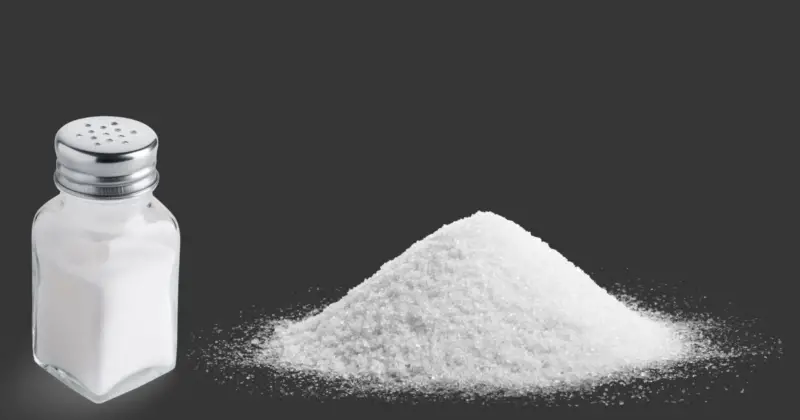
As a pug owner, it’s important for you to be aware of the role salt plays in your dog’s diet. Salt is necessary for all living beings, including dogs, as it helps maintain proper hydration and cell function. However, too much salt can have negative consequences for your pug’s health.
Excessive salt intake can cause dehydration in pugs, as their bodies will struggle to maintain a proper balance of fluids. Signs of dehydration in pugs may include lethargy, sunken eyes, dry mouth, and a loss of appetite. To prevent dehydration, always give your pug access to fresh water, and be mindful of salt consumption.
Nuts, although generally not toxic to dogs, are often high in fat and salt content, which can lead to obesity and pancreatic issues in dogs. Feeding your pug salted nuts, such as cashews, can result in water retention and other health problems. To avoid these issues, opt for unsalted, roasted nuts when offering them as an occasional treat to your pug. However, it is important to remember that nuts should not become a regular part of their diet due to their high fat content.
In conclusion, when considering your pug’s diet, it is crucial to monitor their salt intake. Avoid offering salted treats or human foods that are high in salt, and focus on providing a balanced diet specifically designed for pugs, such as the Royal Canin Breed Health Nutrition Pug Dry Dog Food. By staying vigilant of your pug’s salt intake, you can help keep them healthy and happy.
Other Nut-based Products and Pugs
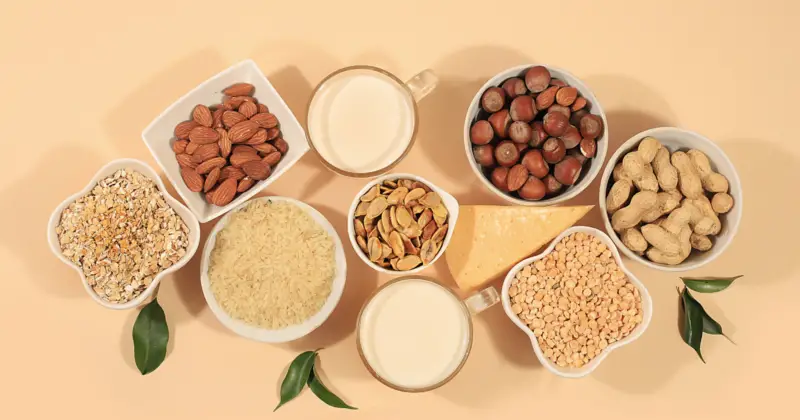
When it comes to nut-based products, you need to be cautious when providing them to your pug. An example of a popular nut-based treat for dogs is peanut butter. Generally, peanut butter is safe for dogs, but it’s crucial to ensure the peanut butter you choose does not contain xylitol, a sugar substitute that can be toxic to dogs.
When giving peanut butter to your pug, it’s recommended to choose a brand that is all-natural and free from added sugars and salt. It’s also wise to only provide this treat in moderation, as too much peanut butter, like other high-fat nuts, can lead to obesity and pancreatic issues source.
So, when giving your pug nut-based products:
- Make sure to avoid giving your dog anything containing xylitol
- Choose all-natural products with no added sugars and salt
- Moderation is key; don’t overdo it
In summary, while some nut-based products like peanut butter can be safe for your pug to consume, it’s essential always to check the ingredients and prioritize their overall health by providing these treats in moderation.
Alternatives to Nuts as Treats for Pugs
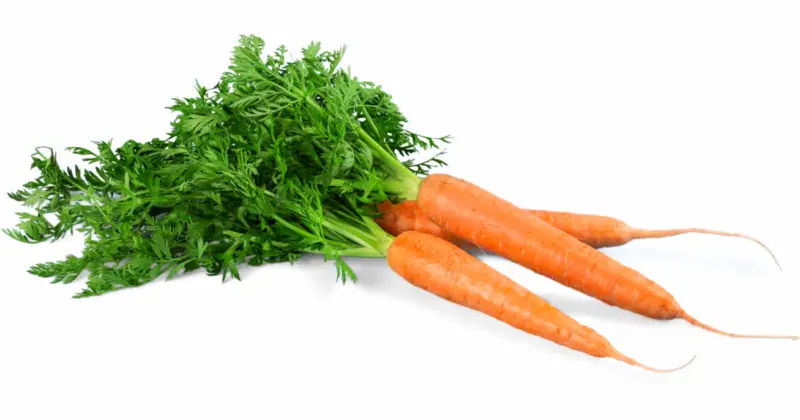
When looking for healthy treatment options for your pug, it is best to avoid nuts due to their high-fat content and potential toxicity. Instead, consider providing your pug with a variety of fruits, vegetables, and high-quality proteins.
Fruits like apples, without the seeds and core, make an excellent low-calorie snack for your pug. They provide vitamins and fiber, promoting overall health. Berries, such as blueberries and strawberries, can also be a sweet and nutritious treat for your pug. Just remember to feed these fruits in moderation.
Vegetables, particularly carrots and sweet potatoes, offer a low-calorie, high-fiber alternative to nuts. Carrots can be given raw as a crunchy snack or cooked to soften them up. Sweet potatoes, meanwhile, should always be cooked before being offered to your pug. These veggies are rich in essential nutrients and can support your pug’s overall health.
As for protein options, chicken is an excellent choice. Cooked and unseasoned, chicken can be an excellent source of lean protein for your pug. Make sure to remove any bones before serving, as they can be a choking hazard or cause digestive issues.
You can mix and match these healthier alternatives to keep your pug’s diet balanced and interesting. However, always consult your veterinarian before introducing new food items to your pug’s diet. By choosing these healthier options, you can ensure that your pug enjoys delicious treats while maintaining its overall well-being.
Potential Health Complications from Nut Consumption
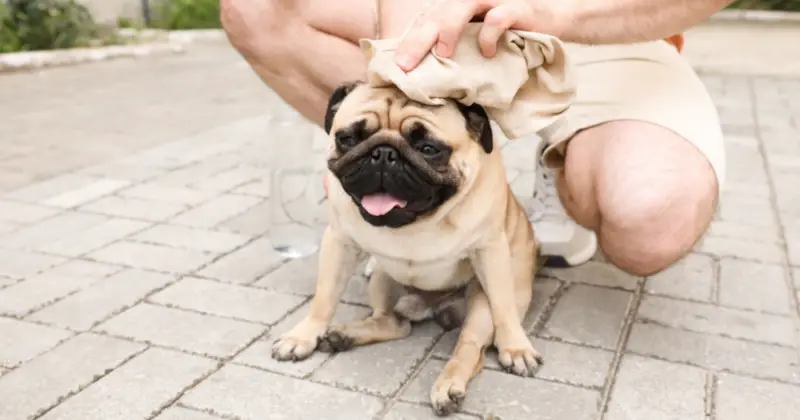
Feeding your pug nuts can cause several health complications. Awareness of these potential issues is essential to keep your beloved pet safe and healthy.
Firstly, nuts pose a choking hazard for pugs. Due to their small size and particular anatomy, pugs may struggle to chew and swallow nuts properly. This can lead to coughing, gagging, or difficulty breathing if a nut becomes lodged in the throat.
Additionally, most nuts are high in fat content. Consuming excessive amounts of nuts can lead to obesity in your pug. Overweight dogs are more susceptible to numerous health problems like joint issues, diabetes, and decreased life expectancy.
High-fat nuts can also contribute to pancreatitis, an inflammation of the pancreas. Dogs with pancreatitis often experience symptoms such as vomiting, diarrhea, and abdominal pain. This condition can become severe and may require a veterinarian’s attention. According to Rover.com, nuts like cashews, almonds, and walnuts are particularly high in fat and can cause these issues in dogs.
Ingesting nuts may also lead to gastrointestinal inflammation in your pug. This can cause discomfort, vomiting, and diarrhea. For example, hickory nuts contain the toxin juglone, which can cause gastrointestinal upset, as mentioned by Spoiled Hounds.
Constipation is another concern when feeding nuts to your pug. The high fiber content in some nuts can lead to difficulty passing feces. Be watchful of any changes in your dog’s bowel movements if you’ve offered them nuts.
Lastly, the consumption of nuts carries the risk of intestinal blockage in your pug. Obstruction can occur if a large or hard nut cannot pass through the digestive system. Signs of blockage may include vomiting, abdominal pain, and an inability to pass feces. As mentioned earlier, hickory nuts can cause this issue, according to Spoiled Hounds.
Knowing these potential health complications can help you make informed decisions about what to feed your pug. Always consult your veterinarian for specific dietary recommendations and advice to keep your pet healthy and happy.
The Pug Owner’s Vet Checkup Guide
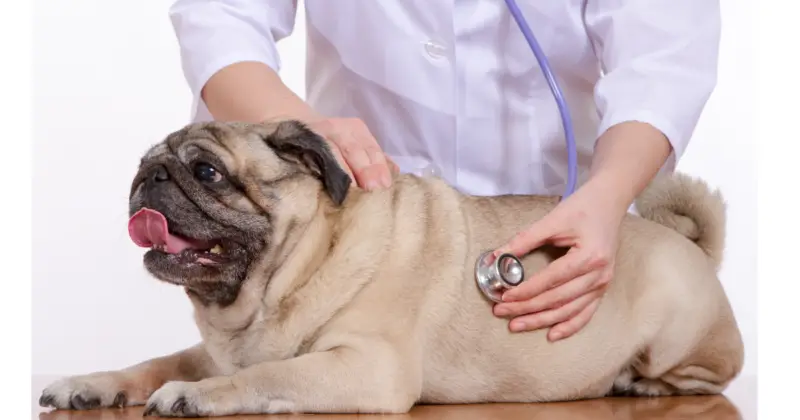
As a responsible pug owner, it’s essential to regularly visit the vet in order to maintain your pug’s overall health. During these checkups, be sure to discuss your pug’s nutrition, especially if you plan to incorporate nuts into their diet.
Before feeding your pug any nuts, seek the guidance of your vet. They have an expert understanding of the potential benefits and risks associated with specific nuts for pugs. For example, pugs can safely consume cashews in moderation, while other nuts, such as almonds or walnuts, are not recommended.
When speaking with the vet, also examine the impact of nuts on your pug’s weight. Pugs can be prone to obesity, so monitoring their caloric intake is crucial. Incorporate any nut-based treatment recommendations given by the vet into your pug’s meal plan accordingly.
During the vet checkup, ask for any guidance about potential allergic reactions to nuts. If your pug has never been exposed to nuts, gradually introducing them may be necessary to ensure they do not have an adverse reaction.
Finally, as a pug owner, be aware of other human foods, such as fruit and vegetables, that may be suitable for your pug’s diet. For a comprehensive list of safe foods, you can refer to this Ultimate Food Guide for Dogs.
By following these guidelines and collaborating with a trusted veterinarian, you can make informed decisions about introducing nuts and other human foods into your pug’s diet, keeping their best interests and health in mind.
Precautions and Recommendations for Feeding Nuts to Pugs
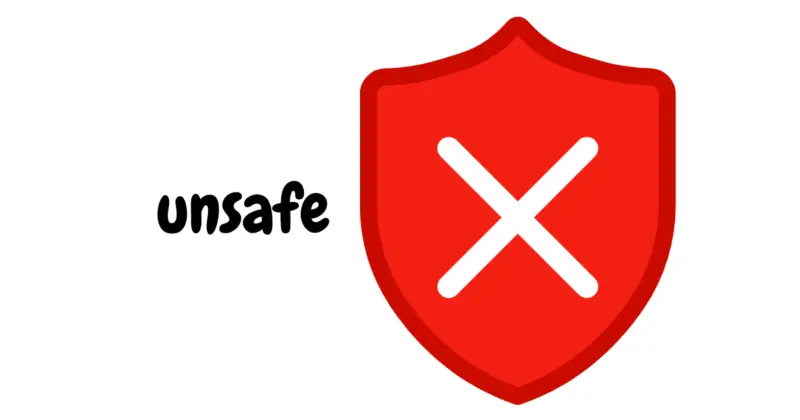
When feeding nuts to your pug, it’s important to exercise caution and be aware of potential risks. While certain nuts, like cashew nuts, can be safely consumed by pugs in moderation, others may pose health risks.
Here are some precautions and recommendations when considering offering nuts as a treat for your pug:
- Be aware that not all nuts are safe for canines, and high-fat content in some can lead to obesity and pancreatic issues. Make sure to research each nut’s safety and nutritional content before feeding it to your pug.
Stick to unsalted, unseasoned nuts. Salted nuts can lead to water retention, and seasoned nuts may contain harmful ingredients for your dog. Keep in mind that moderation is key; large quantities of any nut can cause digestive issues.
- Raw cashews can be toxic to dogs, so choose roasted cashews when offering this treat to your pug. This reduces any potential risk of toxicity.
- Remember that pugs can have a balanced and healthy diet with various human foods like fruits, vegetables, dairy products, meat, and fish. Nuts can be an occasional treat but shouldn’t replace a well-rounded diet.
Keeping these recommendations in mind and feeding your pug nuts in moderation can provide your furry friend with a safe and enjoyable treat. Always stay informed about which human foods are safe for your pug and be attentive to their individual dietary needs.
Conclusion: Can Pugs Eat Nuts
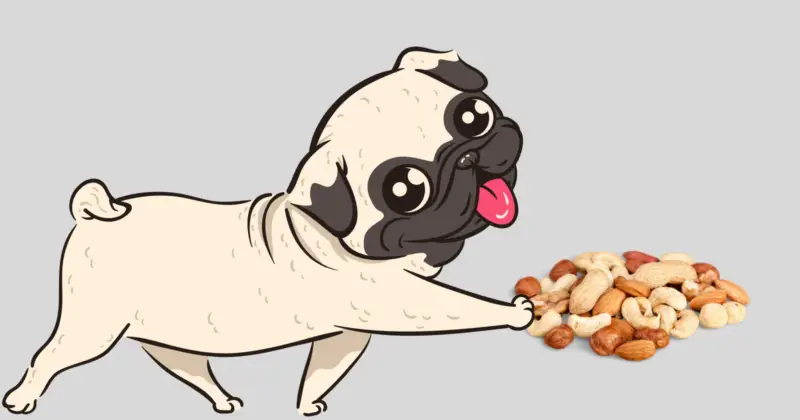
As a pug owner, it’s important to be aware of what types of nuts your furry friend can safely consume. Peanuts, for example, are a safe option for dogs as they are considered legumes and provide some health benefits. However, offering them in moderation is still essential to avoid any potential health issues.
On the other hand, many nuts are unhealthy for dogs and should be avoided. Offering the wrong type of nut can lead to serious health consequences for your pug. When in doubt, always consult with your veterinarian before introducing new foods into your dog’s diet.
To ensure your pug remains healthy and well-nourished, be sure to provide a balanced diet that meets their specific nutritional needs. The Royal Canin Breed Health Nutrition Pug Dry Dog Food is a great option, as it is specially formulated for the breed. Your pug will maintain optimal health and happiness by staying informed and making appropriate dietary choices.
Frequently Asked Questions
Can pugs consume almonds?
While almonds are not toxic to dogs, they are not a recommended treat for pugs. Almonds can be difficult for pugs to digest and may cause gastrointestinal distress. Furthermore, their small size and hard texture pose a choking hazard for these small dogs. It is best to avoid giving your pug almonds.
Are walnuts safe for pugs?
Walnuts should not be given to pugs, as they can be harmful. These nuts contain a toxin called juglone, which can cause gastrointestinal upset in dogs. Moreover, moldy walnuts can produce tremorgenic mycotoxins, leading to seizures and other neurological issues. Keep your pug away from walnuts to ensure their safety.
Is it okay for pugs to eat pecans?
Pecans are not recommended for pugs, either. Like walnuts, pecans can also contain mold and mycotoxins that can lead to serious health issues. Additionally, pecans have a high-fat content, which can contribute to obesity and pancreatitis. For these reasons, keeping pecans off your pug’s menu is best.
Should pugs avoid macadamia nuts?
Pugs should absolutely avoid macadamia nuts. These nuts are toxic to dogs and can cause severe symptoms such as vomiting, weakness, hyperthermia, and even paralysis. The ingestion of macadamia nuts should be treated as an emergency, and you should contact your veterinarian immediately if your pug consumes any.
Are hazelnuts harmful to pugs?
Hazelnuts are not toxic to dogs, but they might not be the best choice for pugs. Similar to almonds, their small size and hard texture can pose a choking hazard, especially for small breeds. Additionally, hazelnuts are high in fat, which can be difficult for pugs to digest properly. It’s best to opt for safer, dog-friendly alternatives when looking for treats.
Can pugs safely eat cashews?
Cashews can be given to pugs in moderation, as they are not toxic to dogs. However, they should only be offered in small quantities and on rare occasions. Cashews are high in fat and calories, which can lead to weight gain and digestive issues if consumed in excess. Make sure to offer unsalted and unflavored cashews, as added salt and seasonings can be harmful to your pug.

